
Anne Brontë was an English novelist and poet, the youngest member of the Brontë literary family.
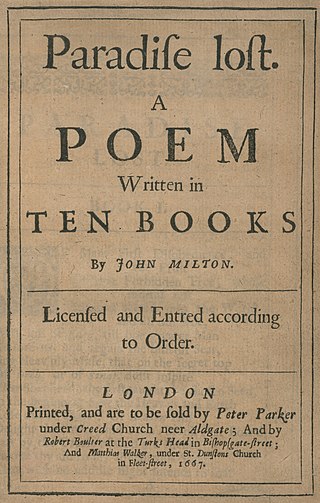
Paradise Lost is an epic poem in blank verse by the 17th-century English poet John Milton (1608–1674). The first version, published in 1667, consists of ten books with over ten thousand lines of verse. A second edition followed in 1674, arranged into twelve books with minor revisions throughout. It is considered to be Milton's masterpiece, and it helped solidify his reputation as one of the greatest English poets of all time. The poem concerns the biblical story of the fall of man: the temptation of Adam and Eve by the fallen angel Satan and their expulsion from the Garden of Eden.
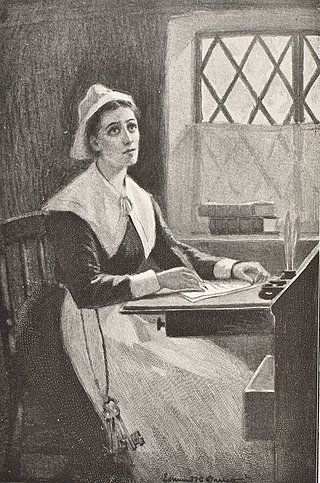
Anne Bradstreet was the most prominent of early English poets of North America and first writer in England's North American colonies to be published. She is the first Puritan figure in American Literature and notable for her large corpus of poetry, as well as personal writings published posthumously.

Ella Wheeler Wilcox was an American author and poet. Her works include the collection Poems of Passion and the poem "Solitude", which contains the lines "Laugh, and the world laughs with you; weep, and you weep alone." Her autobiography, The Worlds and I, was published in 1918, a year before her death.

The poem "In Memoriam A.H.H." (1850) by Alfred, Lord Tennyson, is an elegy for his Cambridge friend Arthur Henry Hallam, who died of cerebral haemorrhage at the age of twenty-two years, in Vienna in 1833. As a sustained exercise in tetrametric lyrical verse, Tennyson's poetical reflections extend beyond the meaning of the death of Hallam, thus, "In Memoriam" also explores the random cruelty of Nature seen from the conflicting perspectives of materialist science and declining Christian faith in the Victorian Era (1837–1901), the poem thus is an elegy, a requiem, and a dirge for a friend, a time, and a place.

"O for a Thousand Tongues to Sing" is a Christian hymn written by Charles Wesley. The hymn was placed first in John Wesley's A Collection of Hymns for the People Called Methodists published in 1780. It was the first hymn in every (Wesleyan) Methodist hymnal from that time until the publication of Hymns and Psalms in 1983.
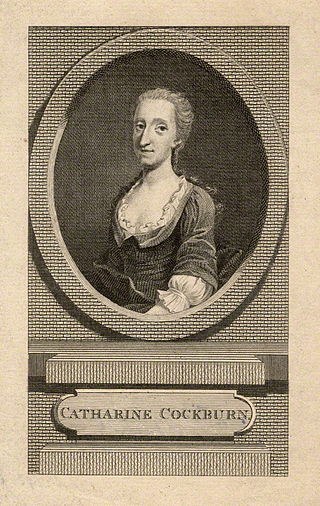
Catharine Trotter Cockburn was an English novelist, dramatist and philosopher who wrote on various subjects, including moral philosophy and theology, and maintained a prolific correspondence.

Anne Killigrew (1660–1685) was an English poet and painter, described by contemporaries as "A Grace for beauty, and a Muse for wit." Born in London, she and her family were active in literary and court circles. Killigrew's poems were circulated in manuscript and collected and published posthumously in 1686 after she died from smallpox at age 25. They have been reprinted several times by modern scholars, most recently and thoroughly by Margaret J. M. Ezell.

Herakles is an Athenian tragedy by Euripides that was first performed c. 416 BC. While Heracles is in the underworld obtaining Cerberus for one of his labours, his father Amphitryon, wife Megara, and children are sentenced to death in Thebes by Lycus. Heracles arrives in time to save them, though the goddesses Iris and Madness (personified) cause him to kill his wife and children in a frenzy. It is the second of two surviving tragedies by Euripides where the family of Heracles are suppliants. It was first performed at the City Dionysia festival.

Exorcism is the religious or spiritual practice of evicting demons, jinns, or other malevolent spiritual entities from a person, or an area, that is believed to be possessed. Depending on the spiritual beliefs of the exorcist, this may be done by causing the entity to swear an oath, performing an elaborate ritual, or simply by commanding it to depart in the name of a higher power. The practice is ancient and part of the belief system of many cultures and religions.
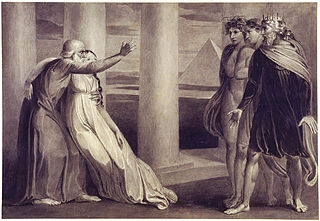
Tiriel is a narrative poem by William Blake, written c.1789. Considered the first of his prophetic books, it is also the first poem in which Blake used free septenaries, which he would go on to use in much of his later verse. Tiriel was unpublished during Blake's lifetime and remained so until 1874, when it appeared in William Michael Rossetti's Poetical Works of William Blake. Although Blake did not engrave the poem, he did make twelve sepia drawings to accompany the rough and unfinished manuscript, although three of them are considered lost as they have not been traced since 1863.
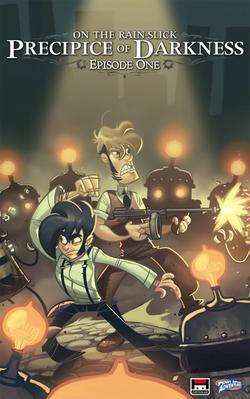
Penny Arcade Adventures: On the Rain-Slick Precipice of Darkness is an episodic action-adventure role-playing video game series based on the webcomic Penny Arcade.
"Night of the Scorpion," included in the AQA Anthology, is a poem written by the Indian Jewish poet, Nissim Ezekiel.

Inferno is the first part of Italian writer Dante Alighieri's 14th-century epic poem Divine Comedy. It is followed by Purgatorio and Paradiso. The Inferno describes the journey of a fictionalised version of Dante himself through Hell, guided by the ancient Roman poet Virgil. In the poem, Hell is depicted as nine concentric circles of torment located within the Earth; it is the "realm ... of those who have rejected spiritual values by yielding to bestial appetites or violence, or by perverting their human intellect to fraud or malice against their fellowmen". As an allegory, the Divine Comedy represents the journey of the soul toward God, with the Inferno describing the recognition and rejection of sin.

Thalaba the Destroyer is an 1801 epic poem composed by Robert Southey. The origins of the poem can be traced to Southey's school boy days, but he did not begin to write the poem until he finished composing Madoc at the age of 25. Thalaba the Destroyer was completed while Southey travelled in Portugal. When the poem was finally published by the publisher Longman, it suffered from poor sales and only half of the copies were sold by 1804.

Roderick the Last of the Goths is an 1814 epic poem composed by Robert Southey. The origins of the poem lie in Southey's wanting to write a poem describing Spain and the story of Rodrigo. Originally entitled "Pelayo, the Restorer of Spain," the poem was later retitled to reflect the change of emphasis within the story. It was completed after Southey witnessed Napoleon's actions in Europe, and Southey included his reactions against invading armies into the poem. The poem was successful, and multiple editions followed immediately after the first edition.
The Tenth Muse, lately Sprung up in America is a 1650 book of poetry by Anne Bradstreet. It was Bradstreet's only work published in her lifetime. Published purportedly without Bradstreet's knowledge, Bradstreet wrote to her publisher acknowledging that she knew of the publication. She was forced to pretend she was unaware of the publication until afterwards, or she would have risked harsh criticism. Bradstreet wrote the poem "The Author to Her Book" in 1666 when a second edition was contemplated. The book was published, without Bradstreet's knowledge, by the Rev. John Woodbridge. Woodbridge took the manuscript to England where it was published.
Anne Dowriche was an English poet and historian of the 16th century.

In Islam, the belief that spiritual entities—particularly, jinn—can possess a person,, is widespread; as is the belief that the jinn and devils can be expelled from the possessed person through exorcism. This practice is called al-'azm or ruqya, and exorcists are called raqi.
Anne (Norman) Ley was an English writer, teacher, and polemicist. She wrote several poems, letters, meditations, and funerary texts. Her husband was Roger Ley, a writer and a curate of St. Leonard's Church in Shoreditch, Middlesex. Both of the couple were ardent royalists and religious conformists.















